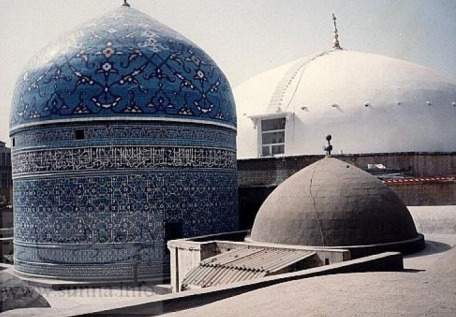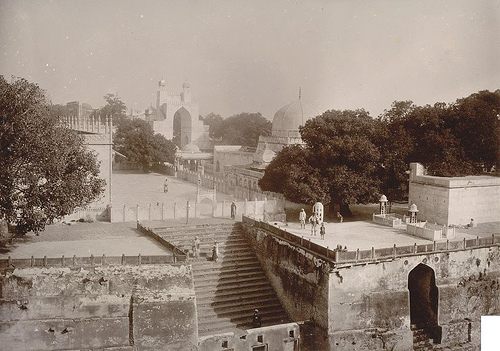Category Archives: Rabi uth-Thani
The Love of Allah: An act of free choice or an involuntary compulsion?
Shaikh ‘Abd al-Qadir al-Jilani, rehmatullahi ta’aala alayhe on the love of Allah – part of a discourse given in AH 545 in Baghdad sharif – 888 years ago shared by Ruslan Moore and translated by the late Muhtar Holland (may Allah have mercy upon his soul):
At this point someone asked: “Do you see love [mahabba] as being experienced in the first instance because of an involuntary compulsion [idtiraran], or by an act of free choice [ikhtiyaran] ?â€
By way of reply, the Shaikh (may Allah be well pleased with him) went on to say:
In the case of a few isolated individuals, the Lord of Truth (Almighty and Glorious is He) simply casts His gaze upon them and He loves them. He shifts them from one thing to another in a single instant. He does not
come to love them gradually, more and more as the years go by. He loves them in a single moment, so they love Him too, of necessity. They notice that all the blessings they have received have come from Him, not from any other. They notice all His kindness and tender loving care, and all the gifts He bestows upon them, so they love Him promptly and immediately, without any gradual process or passage of time.
In the case of the vast majority, however, it is a matter of choice. Lovers begin to choose Allah (Exalted is He) in preference to His creatures, then they start choosing Him in preference not only to this world, but also to the hereafter. They start giving up things that are either strictly unlawful [haram] or merely of dubious legality [shubha], then they cut back on their consumption of things that are lawful [halal]. They prefer to lead a very simple life, making do with basic things that are readily available. They shun bed and blankets, sleep and rest.
Their sides shun their couches [as they call on their Lord in fear and hope]. (32:16)
Their night is no longer an ordinary night, and their day is no longer an ordinary day. They say: “Our God [Ilahana], we have left everything behind the backs of our hearts, and we have hastened toward You, so that
You might be well pleased.†They journey toward Him on the feet of their hearts [qulub], sometimes on the feet of their innermost beings [asrar], sometimes on the feet of their earnest intention [irada], sometimes
on the feet of their aspiration [himma], sometimes on the feet of their genuine sincerity [sidq], sometimes on the feet of their love [hubb], sometimes on the feet of their ardent longing [shawq], sometimes on the feet of their meekness [dhull] and their modest humility [tawadu’], sometimes on the feet of their fear [khawf], sometimes on the feet of their hope [raja ‘], and all of this out of love for Him and eager yearning to meet with Him.
In your own case, O questioner, you belong to the group consisting of those who love Allah (Almighty and Glorious is He) both through involuntary compulsion [idtiraran] and through a process of free choice
[ikhtiyaran]. So, since your question cannot be answered simply, either this way or that, you had better hold your tongue and concentrate on practicing Islam as it ought to be practiced!
If only you could experience all that Islam and faith [iman] can mean! If only you would leave the company of the unbelievers [kafirin] and the hypocrites [munafiqin] today, and stay away from them tomorrow. If only you would get up and walk away from meetings held by those who idolize their fellow creatures and material means [al-mushrikin bi ’l-khalq wa ’l-asbab], and who quarrel with the Lord of Truth (Almighty and Glorious is He)! You must repent and mend your ways. Do not meddle with the treasuries of worldly kings, and do not pry into their secrets.
Shaikh Hammad (may Allah the Exalted be well pleased with him) would often say: “If a person does not acknowledge his own worth, the decrees of destiny will teach him to acknowledge his own worth [man lam
ya’raf qadrahu ‘arrafat-hu ’l-aqdaru qadrah].†To recognize your own worth is better than refusing to acknowledge your own worth, because an ignorant person is someone who knows neither his own worth nor the worth of other people.
O Allah, do not include us among the ignorant, lying pretenders!
O Allah, include us among those of Your creatures who enjoy Your special favor, and:
Give us in this world good, and good in the hereafter, and guard us against
the torment of the fire! (2:201)
On Lunar and Solar Eclipses – From the Malfuzat of Khwaja Uthman Haruni (ra)
The following is an excerpt taken from Session 2 of the Anees ul-Arwah–The Malfuzat of Khwaja Uthman Haruni (rehmatullahi alyhe)–as recorded by Khwaja Moinuddin Chishti (rehmatullahi alayhe):
Regarding the matter of eclipse of the Sun and Moon, their reality is so that the bondsmen of God inclines to prayer and piety out of fear of their Lord taking them to task. The master (may the mercy of God be upon him) said regarding the Sun and Moon eclipse that Ibn Abbass (may the mercy of God be upon him and his father) relates that during the time of the Prophet (peace and blessings be upon him) there occurred a Lunar Eclipse. So, someone asked the Final Messenger a question, upon which the Prophet (pace be upon him) responded that when humanity goes beyond its boundaries in wrong actions or sin then Lunar and Solar eclipses occur. The face of the Sun and that of the Moon are darkened so that creation may take heed (from the metaphor).
The Ilm Qiyaafah mentions that if a Lunar Eclipse occurs in the month of Muharram then in that that year there will be much bloodshed and corruption. If it occurs in the month of Rabi ul-Awwal then there will be increased famine, death and floods. If it occurs in the month of Rabi ul-Aakhir then change of leadership and anarchy will occur in the nation. If it occurs during the month of Jamadi ul-Awwal then there will be overflowing rain and unexpected death. In Jamadi ul-Aakhir there will be bumper crops , affordable prices, and people will have a higher quality of life. If it occurs in the month of Rajab on a Friday then in that year there I will be hunger, calamity, along with darkness in the sky. If it occurs in the month of Shaban, then there will be treaties between people and relative calm. If it occurs during the month of Ramadan, on the first Friday, then there will be increased events of thunder from the sky. In the month of Shawwal men-related sicknesses will be inflicted. If it occurs during the month of Dhu al-Hijjah, then the rest of the year will be full of happiness and relative calm. If it occurs in the month of Muharram then the entire year will be in corruption, and humanity will find fault in others, people will destroy their hereafter and hypocritical wealthy people will be honored over others deserving of it.
After mentioning this, the master busied himself in worship and the people returned home and praise to God for that (lesson).
Translated by Sharaaz Khan
26 Shaban 1432 Hijri
Ghauth ul-A’zam Shaykh Syed Abdul Qadir al-Jilani (may Allah be pleased with him)
The Crown of the Saints (the Sultan of the Awliya of Allah), Syeduna Shaykha Abdul Qadir al-Jilani (may Allah be pleased with him) is a descended from the family of the Blessed Prophet Muhammad (peace be upon him) both from Hadrat Husayn and Hadrat Husan radiallahu anhuma. His status in the Ummah is unquestionable and his Karaamat (miracles) are mutawaatir (have come down through so many chains of narration that they cannot be denied).
Read about this great saint of Allah in by clicking the following link:
Hazrat Ghaus-e-Azam Shaykh AbdulQadir Jilani (may Allah be pleased with him)
IECRC Staff

















